Each month, countless women navigate a rollercoaster of physical and emotional changes linked to their menstrual cycle. While many experience the familiar discomfort of premenstrual syndrome (PMS), others contend with a more debilitating condition known as Premenstrual Dysphoric Disorder (PMDD). This often-overlooked disorder can severely impede daily life, yet it remains shrouded in misunderstanding.
In this exploration, we will uncover the distinctions between PMS and PMDD, delve into potential causes, and discuss effective strategies for managing and alleviating symptoms.
Difference Between PMS And PMDD
Premenstrual Syndrome, or PMS, affects an estimated 75 per cent of menstruating women at some point in their lives. It’s typically characterised by symptoms such as bloating, breast tenderness, mild irritability, and food cravings. For most, these symptoms are manageable, causing discomfort but not necessarily interrupting life. PMS is usually a mild to moderate condition that appears in the days leading up to a period and quickly fades as menstruation begins.
Premenstrual Dysphoric Disorder, or PMDD, however, is far more severe and less common, affecting about 3-8% of women. Unlike PMS, PMDD is marked by extreme mood shifts, intense anxiety, and even feelings of hopelessness. The symptoms of PMDD can feel overwhelming, disrupting work, relationships, and personal well-being. The contrast between PMS and PMDD can be compared to the difference between feeling “under the weather” versus feeling completely unable to function.
Common Symptoms Of PMS Include:
Mood swings
Physical discomforts such as bloating, breast tenderness, and headaches
Fatigue Changes in sleep and appetite PMDD Symptoms, on the Other Hand, Tend to Be More Intense:
Severe mood swings, often with feelings of anger or despair Intense anxiety or tension Depression, sadness, and feelings of hopelessness Difficulty concentrating and fatigue so profound it’s challenging to accomplish daily tasks The emotional symptoms of PMDD can be so severe that they closely resemble those of clinical depression or anxiety disorders, often leading to misdiagnosis and misunderstanding.
The Science Behind PMS and PMDD
What causes PMS and PMDD.While the precise cause isn’t fully understood, research suggests that a complex interaction of hormonal changes, genetics, and brain chemistry could be to blame. Here’s what experts believe might be driving these conditions:
Hormonal Shifts: As a woman’s body transitions through her menstrual cycle, levels of estrogen and progesterone fluctuate. While these changes are natural, they can affect the brain chemicals that regulate mood, particularly serotonin. For some women, these hormonal shifts may trigger significant physical and emotional changes.
Serotonin Sensitivity: Serotonin is a key neurotransmitter involved in mood regulation. Many scientists believe that women with PMDD may be more sensitive to changes in serotonin levels, which could explain the severe mood swings and emotional challenges.
Genetic Factors: Research suggests that PMS and PMDD may run in families, indicating a genetic predisposition for these conditions. Women with a family history of PMDD, PMS, depression, or anxiety may be at a higher risk.
Stress and Lifestyle Factors: While stress doesn’t directly cause PMS or PMDD, it can exacerbate symptoms. Women under high levels of stress, who experience irregular sleep patterns, or who consume a diet high in sugar and processed foods may find that their symptoms are more pronounced.
Managing PMS and PMDD: Practical Approaches for Symptom Relief
For many women, lifestyle changes, mental health support, and sometimes medication can be life-changing. Here’s a closer look at the approaches that have shown to be effective:
Diet and Nutrition Adjustments
Eating a well-rounded diet rich in whole foods—such as leafy greens, lean proteins, and whole grains—may help stabilise blood sugar and reduce mood swings. Cutting back on caffeine, alcohol, and salty foods can alleviate bloating and may reduce feelings of anxiety and irritability.
Regular Physical Activity:
Exercise is a natural mood booster. Engaging in aerobic activities like walking, swimming, or cycling releases endorphins, which help reduce pain and improve mood. Many women find that regular exercise lessens the impact of both PMS and PMDD symptoms.
Sleep And Stress Management
Quality sleep and low-stress levels can play a crucial role in managing symptoms. Practices like mindfulness meditation, deep breathing exercises, and yoga may help women feel more centered, reducing stress-related mood swings and physical tension.
Medical Treatments
For moderate to severe cases, medical interventions may be necessary. Over-the-counter pain relievers, like ibuprofen, can alleviate physical discomfort. For PMDD, antidepressants such as selective serotonin reuptake inhibitors (SSRIs) may be prescribed to help stabilize mood. Hormonal treatments, including certain types of birth control, are also sometimes recommended to reduce symptoms.
Therapeutic Support
For women dealing with intense emotional symptoms, working with a therapist can be incredibly beneficial. Cognitive Behavioral Therapy (CBT) has been shown to help women with PMDD manage negative thought patterns, improve emotional resilience, and develop effective coping strategies. Support groups—both online and in person—can also offer a sense of community and shared experience.
Finding Support and Seeking Help
If PMS or PMDD symptoms are affecting your quality of life, it’s essential to reach out for help. Gynecologists, primary care doctors, and mental health professionals are familiar with these conditions and can offer guidance on finding the right combination of treatments and support.











